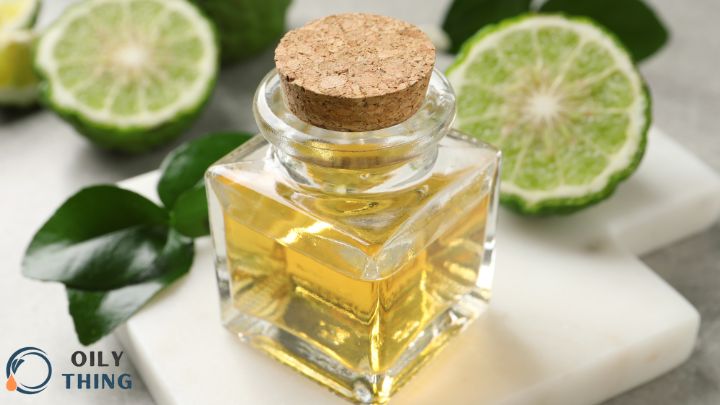Bergamot Essential Oil Aroma Profile
Is derived from the bergamot fruit, which is a type of citrus fruit that is mostly grown in Italy.
The aroma of bergamot essential oil is often described as fresh, fruity, and slightly floral.
It has a sweet, citrusy scent that is similar to that of oranges or lemons, but with a more complex and layered aroma.
Table of Contents
One of the main components of bergamot oil is limonene, which is a terpene that is found in many citrus fruits.
Limonene is responsible for the fresh and citrusy scent and it has also been shown to have a number of health benefits.
Another important component is linalool, which is a terpene alcohol that is found in many essential oils.
Linalool has a floral, fresh, lavender-esque scent, and it is often used in perfumes and other cosmetic products.
It also contains linalyl acetate, which is an ester that is found in many essential oils.
Linalyl acetate has a sweet, fruity aroma that is similar to that of lavender, and it is often used in aromatherapy to promote relaxation and reduce stress.
If you want to try, I recommend Cliganic Organic Bergamot Essential Oil it is a 100% pure, natural, and Non-GMO Verified.
This product is from a small business brand. Support small businesses.
As an Amazon Associate, I earn from qualifying purchases.
Primary Scent Characteristics
Has a unique fragrance that can be described as citrusy, floral, spicy, and earthy.
Each of these primary scent characteristics contributes to the overall aroma of the oil.
Citrus Notes
The citrus notes are perhaps the most prominent.
This is due to the high concentration of limonene, a compound found in the oil that gives it a bright, zesty scent.
The citrus notes are reminiscent of oranges and lemons, and they provide a refreshing and uplifting quality to the fragrance.
Floral Undertones
In addition to the citrus notes, bergamot also has subtle floral undertones.
These come from compounds such as linalool and linalyl acetate, which are found in the oil.
The floral notes add a delicate sweetness to the fragrance, making it more complex and interesting.
Spicy Elements
It also has a spicy quality, thanks to compounds such as bergapten and bergamottin.
These compounds give the oil a warm, slightly peppery scent that balances out the citrus and floral notes.
The spicy elements make it a great addition to blends designed to promote relaxation and calm.
Earthy Accents
Finally, it has earthy accents that come from compounds such as alpha-pinene and beta-pinene.
These give the oil a grounding quality that can help to balance out the more uplifting and energizing aspects of the fragrance.
The earthy accents make it a versatile ingredient in blends designed to promote overall wellness.
Aroma Intensity and Longevity – Top Note Scent Profile
In my experience, bergamot essential oil has a moderate aroma intensity.
It’s not overpowering, but it’s also not too subtle.
When diffused, it fills the room with a pleasant citrus scent that’s not too strong.
However, when used in a personal scent or perfume, the aroma can be a bit more subtle.
This is because the oil is not as strong as other citrus oils like lemon or grapefruit.
But that’s not necessarily a bad thing – bergamot’s unique aroma adds a nice touch to any fragrance blend.
In terms of longevity, it has a moderate staying power.
When diffused, the scent can last for a few hours before dissipating.
When used in a personal scent, it can last for a few hours to half a day, depending on the concentration.
It’s important to note that bergamot essential oil is a top note, which means it evaporates quickly.
This is why it’s often blended with other oils to create a more well-rounded scent.

Common Combinations with Other Scents and Fragrance
When it comes to essential oils, combining different scents can create a unique and powerful aroma.
Bergamot essential oil is no exception. Here are some common combinations with other scents that work well with bergamot:
- Lavender: Lavender and bergamot essential oils complement each other well.
The floral and calming scent of lavender mixed with the bright and citrusy scent of bergamot creates a soothing and relaxing atmosphere. - Peppermint: Bergamot and peppermint essential oils make a refreshing and invigorating blend.
The cooling and minty scent of peppermint combined with the uplifting and citrusy of bergamot can help boost energy levels and improve mood. - Ylang-ylang: Ylang-ylang and bergamot create a sweet and exotic aroma.
The floral and slightly spicy scent of ylang-ylang mixed with the bright and citrusy aroma of bergamot oil can help reduce stress and promote relaxation. - Frankincense: Frankincense and bergamot make a grounding and earthy blend.
The woody and resinous scent of frankincense mixed with the uplifting and citrusy scent of bergamot can help promote feelings of peace and tranquility. - Geranium: Geranium and bergamot create a floral and uplifting aroma.
The sweet and rosy scent of geranium mixed with the bright and citrusy smell of bergamot can help balance emotions and reduce anxiety. - Cedarwood: Cedarwood and bergamot make a warm and cozy blend.
The woody and earthy scent of cedarwood mixed with the bright and citrusy scent of bergamot can help promote feelings of comfort and relaxation.
Uses in Aromatherapy
“Citrus bergamia Risso et Poiteau” or Bergamot is one of the most popular oils used in aromatherapy.
Its refreshing, citrusy scent makes it a great choice for diffusing or adding to homemade candles and perfumes. Here are some of the most common uses in aromatherapy:
Stress Relief
Is known for its calming and soothing properties. It can help reduce feelings of anxiety, stress, and depression.
When diffused, bergamot oil can help create a relaxing atmosphere that promotes rest and relaxation.
Mood Enhancement
The fresh, uplifting scent can help improve your mood and increase feelings of happiness and well-being.
It is often used in aromatherapy blends designed to boost energy and promote positivity.
Skin Care
Is a popular ingredient in natural skin care products.
It has antiseptic and antibacterial properties that can help prevent acne and other skin infections.
Bergamot oil can also help balance oily skin and reduce the appearance of scars and blemishes.
Digestive Support
Can help promote healthy digestion and relieve symptoms of indigestion, bloating, and gas.
It can also help stimulate the production of digestive enzymes, which can improve nutrient absorption and support overall digestive health.
Influence of Growing Conditions on Scent
As with any plant, the smell of bergamot essential oil can vary depending on the growing conditions.
The quality of the soil, amount of sunlight, and temperature can all affect the aroma of the oil.
One factor that can influence the bergamont scent is the altitude at which the plant is grown.
Bergamot trees grown at higher altitudes tend to produce a more floral and delicate aroma, while those grown at lower altitudes can have a stronger, more citrusy scent.
Another important factor is the time of year when the bergamot fruit is harvested.
The aroma of the oil is at its strongest and most complex when the fruit is harvested during the winter months.
This is when the fruit is fully ripe and the essential oil is most concentrated.
The method of extraction can also play a role in the scent.
Cold-pressed bergamot oil is known for its fresh, citrusy aroma, while steam-distilled bergamot oil has a more delicate, slightly floral scent.
Variations Between Different Bergamot Oils
There are different types of bergamot essential oils available in the market, and the differences between them lie in how they are extracted, where they are grown, and how they are processed.
One of the most popular types is the Italian Bergamot oil.
This oil is extracted from the bergamot fruit grown in Italian province of Reggio Calabria, Italy, and is known for its fresh and sweet aroma.
It is commonly used in perfumes, cosmetics, and aromatherapy due to its uplifting and calming properties.
Another type is the Organic Bergamot oil.
This oil is extracted from the organic bergamot fruit and is processed without the use of any chemicals.
It is known for its strong and intense aroma, which makes it perfect for use in natural perfumes and skincare products.
There is also a Bergamot Mint oil, which is a hybrid of bergamot and mint essential oils.
This oil has a fresh and minty aroma, and is commonly used in aromatherapy to promote relaxation and reduce stress.
I trust that my blog post on “What Does Bergamot Essential Oil Smell Like” has been informative and addresses your query. Should you have any further questions or need clarification, please feel free to reach out to me through my contact page. I am here to assist you.

